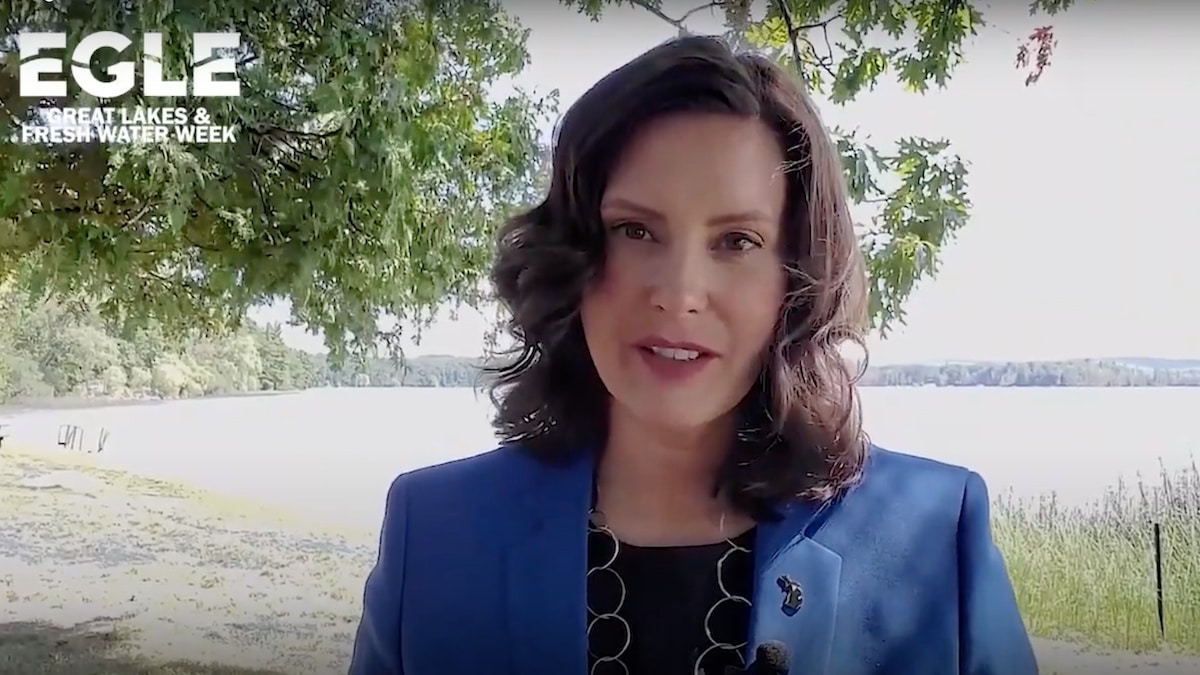
Michigan Governor Moves to Prevent Great Lakes Oil Spill by Shutting Down Aging Pipeline

Michigan Governor Gretchen Whitmer Celebrates Great Lakes and Fresh Water Week, on Aug. 14, 2020. Michigan EGLE / YouTube
Enbridge’s aging Line 5 pipeline may finally be forced into retirement.
Michigan Gov. Gretchen Whitmer and Michigan Department of Natural Resources Director Dan Eichinger informed Enbridge Friday that they were revoking the Canadian company’s easement to run twin pipelines under the Straits of Mackinac, which divide Lakes Michigan and Huron, the Detroit Free Press reported.
“Here in Michigan, the Great Lakes define our borders, but they also define who we are as people,” Whitmer said in a statement reported by the Detroit Free Press. “Enbridge has routinely refused to take action to protect our Great Lakes and the millions of Americans who depend on them for clean drinking water and good jobs.”
The Line 5 pipeline has carried fossil fuels beneath the Straits since 1953, when it was granted an easement to do so by the state of Michigan. It currently carries 23 million gallons of oil and gas each day through Michigan’s Upper Peninsula, splits in two to transport it beneath the lakes and then carries it in another single pipeline through the Lower Peninsula into Ontario.
Whitmer argued that Enbridge had violated the terms of the easement by ignoring structural problems that increased the risk of a devastating oil spill in the Lakes. For example, Enbridge was aware that a section of the underwater coating on the twin pipelines was damaged in 2014 but did not inform the state for three years. Whitmer is giving the company until May of 2021 to cease operations in the Straits.
At the same time, Michigan Attorney General Dana Nessel filed a complaint in Ingham County Circuit Court asking the judge to uphold the governor’s action, Michigan Live reported.
Whitmer contends that the pipelines violate the “public trust” doctrine, which entrusts Michigan with protecting the bottom of the Great Lakes for its residents.
“Transporting millions of gallons of petroleum products each day through two 67-year old pipelines that lie exposed in the Straits below uniquely vulnerable and busy shipping lanes presents an extraordinary, unreasonable threat to public rights because of the very real risk of further anchor strikes and other external impacts to the Pipelines, the inherent risks of pipeline operations, and the foreseeable, catastrophic effects if an oil spill occurs at the Straits,” the notice she sent to the company read.
Enbridge, however, countered that the pipelines remained safe.
“This notice and the report from Michigan Department of Natural Resources are a distraction from the fundamental facts,” Enbridge Liquids Pipelines Executive Vice President and President Vern Yu said in a statement reported by Michigan Live.
Alberta Premier Jason Kenney also opposed the move.
“The impact of this would be devastating,” Kenney said, as Global News reported. “It is the single largest supply of gasoline ultimately in southern Ontario, for aviation fuel out of the Detroit airport, for heating fuel in northern Michigan, for the refineries in northern Ohio that fuel much of the midwest U.S. economy, so this is a very very big deal.”
However, environmental groups, who have long raised alarms about the pipeline, praised Whitmer’s decision.
“Line 5 should have never been built in the first place,” Mike Shriberg, regional executive director of the National Wildlife Federation’s Great Lakes Regional Center, told the Detroit Free Press. “Gov. Whitmer is now bravely, and correctly, standing up for the Great Lakes. This is a legacy-defining action by the governor. She is standing on the side not only of clean water, but clean energy and the jobs that go along with the transition to a renewable energy economy.”
The National Wildlife Federation noted that another Enbridge pipeline was responsible in 2010 for one of the worst inland oil spills in U.S. history, when its Line 6b spilled more than one million gallons of tar sands into 40 miles of the Kalamazoo River.
Whitmer’s action will not immediately affect plans to replace Line 5 with a new pipeline to be installed in a tunnel drilled into the bedrock beneath the Straits, according to Global News. The deal to build the replacement was struck between Enbridge and Whitmer’s predecessor Republican Rick Snyder. However, Enbridge is still in the process of seeking state and federal permits for the project.
Environmental groups oppose the replacement as well, arguing that the Great Lakes would be vulnerable to spills during the seven to 10 year construction process and that there are better ways to meet Michigan’s energy needs. Now, Shriberg argued that Whitmer’s shutdown of the existing pipelines would bolster the case of those who oppose their replacement.
“Enbridge could still go ahead with their current tunnel proposal, but it’s going to be much harder to prove to regulators there’s a need if Line 5 is already shut down,” he told the Detroit Free Press.
- Standing Rock Veterans Lead Fight to Shut Down Enbridge Line 5 ...
- Great Lakes 'At Risk' From Plan to Replace Aging Enbridge ...
- Enbridge Pipeline Day of Reckoning? Indigenous Rights Groups Join Michigan Gov. Whitmer in Demanding Shutdown
- Enbridge Line 5 Pipeline Violates Michigan Order, Continues Operating

 233k
233k  41k
41k  Subscribe
Subscribe 